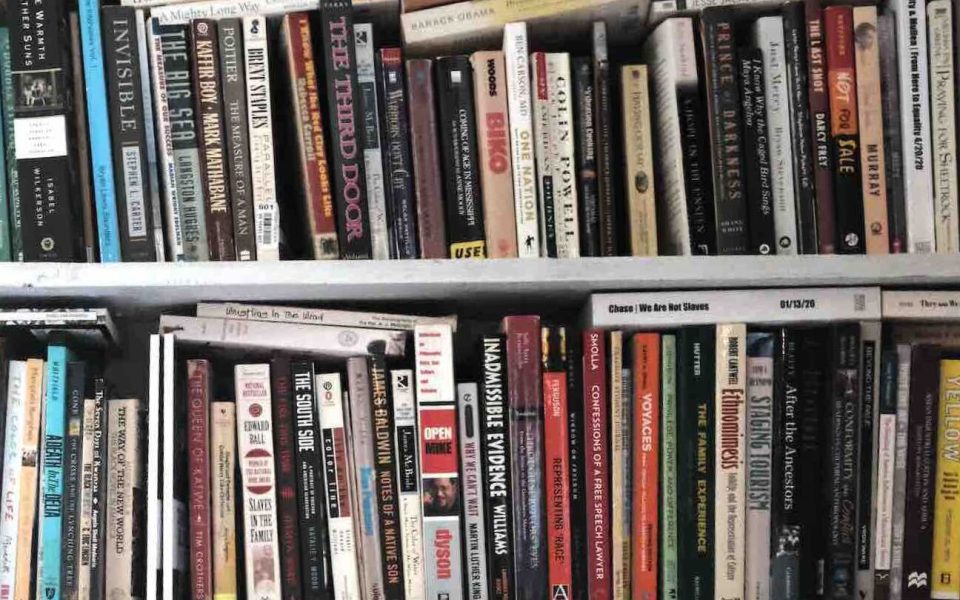Featured photo: Courtesy of Prison Books Collective
The Solidarity Book Drive has a special wish this holiday season: to send as many books as possible to people in prisons in the new year.
Since 2021, the Triad Abolition Project, a Triad-based prison abolitionist organization, has been hosting the book drive which sends free books to imprisoned people. This year, the organization is once again collaborating with Prison Books Collective (PBC), a Durham-based non-profit.
Until January 31, those interested can drop off their new and gently used paperbacks to one of two bookstores: Scuppernong Books in Greensboro or Bookmarks in Winston-Salem.
According to donation outreach volunteer Ivy Shelton, sending books into prisons can expand those incarcerated’s worlds.
They can remedy the isolating experience of being incarcerated and help them connect to others, Shelton says. Once they’re done, the receiver can give their book to someone else or donate it to the prison library.
“We believe that books expand people’s awareness of themselves and the world around them,” says Steve Mitchell, co-owner of Scuppernong Books.
People in prisons often don’t have access to music players and movies, says Steve Mitchell, co-owner of Scuppernong Books. Books are an easier medium to send to them, he adds.
The books received from the drive will be added to PBC’s bookhouse, where volunteers receive request letters for all types of literature from people in North Carolina and Alabama prisons. Volunteers search for one or two books to send that best match the request along with a short, encouraging note.

The practice of accepting requests is one reason why PBC maintains a list of preferred genres, Shelton says. Urban fiction, dictionaries and legal guides are among these genres that are often requested, but rarely donated.
It is important to give people serving time the books they want rather than random ones, says Triad Abolition Project organizer Nia Sadler.
“They need to have a say in what they’re encountering,” Sadler adds.
Having any connection to the outside world can break the isolation of being incarcerated, Sadler says. And the more human the connection, the better. They mention how there are multiple restrictions on incarcerated people’s freedom both within and outside of the prison system.
For example, prisons have strict requirements for donated books. This means the book drive cannot accept books that are hardcover or that contain markings, gang-related material, nudity, or content related to tattooing. The NC Department of Adult Corrections also maintains a list of banned books. While some books on the list fall clearly into the above categories of infraction, others are less explainable such as “Homesteading” or “Coding for Beginners.”
But that doesn’t mean the effort isn’t worth it.
“All of those points of connection are censored in a way that is so violent and dehumanizing,” Sadler adds. “Being able to send something to someone serving time so that they might connect with themselves or someone on the outside or someone they’re serving time with is paramount.”
The other reason why the donation drive is important is because not all prisons have libraries, according to Prison Books Collective. And even if they do, Individuals’ access to books in the prison library can be limited by the hours of operation and check-out limits.

In addition to being a form of escape or entertainment, books can also have a practical use. They can assist imprisoned people in gaining practical skills, such as carpentry or entrepreneurship, so they can obtain a job when they finish serving their sentence, Shelton says.
Other groups bring additional kinds of media to incarcerated people like radio station WMMT-FM which provides a connection to the outside world for people in Central Appalachia prisons, Sadler says. In these ways, media can be a “humanizing” force.
“That access to media is really important. We access media all the time and when you’re serving time it’s much harder,” they add.
For those wanting to get involved, they can donate to the book wish list on the Prison Books Collective website, contact PBC if they want to do a book donation drive themselves, or donate money to PBC to pay for mailing prices, which Shelton says is steadily increasing. And especially during the holidays, giving a book can go a long way for those inside prisons.
“To be able to take someone to a place through a book while they’re serving time is a gift and I would do it over and over again for this population of people,” says Sadler.
Books can be dropped off at Scuppernong Books (304 S Elm St. in GSO) or Bookmarks (634 W 4th St #110 in W-S).
Join the First Amendment Society, a membership that goes directly to funding TCB‘s newsroom.
We believe that reporting can save the world.
The TCB First Amendment Society recognizes the vital role of a free, unfettered press with a bundling of local experiences designed to build community, and unique engagements with our newsroom that will help you understand, and shape, local journalism’s critical role in uplifting the people in our cities.
All revenue goes directly into the newsroom as reporters’ salaries and freelance commissions.


Leave a Reply